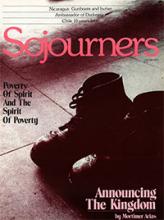The following article is adapted from a meditation given in Cincinnati, Ohio, in February 1983. The occasion was the annual gathering of pastors from communities which comprise the Community of Communities, a circle of communities of which Sojourners Fellowship was a part. —The Editors
The spiritual journey goes on—in our individual lives, in our local communities, in this Community of Communities. More than three years ago I spoke on this journey as a journey into weakness, and leadership as suffering servanthood. There is, however, a far greater significance for our journey into weakness. It is not only for the sake of developing trustworthy spiritual leadership or even for the reason Paul cites "that the power of God might be made known in our weakness" (2 Corinthians 12:9).
Our journey into weakness is absolutely essential for us to minister to the poor and to discern the true meaning and significance of the good news in our contemporary historical context. Perhaps our journey into weakness could more accurately be called a journey into poverty or littleness. Whereas weakness defines human experience in the language of self-analysis and self-perception, poverty or littleness describes human experience in broader economic and sociological terms. When we speak of the "poor" or the "little ones" we are speaking of more than psychological perception; we are speaking about historical realities related to wealth, position, and power.
When I first realized the meaning of the biblical challenge to "identify with the poor" I hardly knew how to respond. How could I, with all my North American, middle-class, white, male options and opportunities, ever experience what the poor of my neighborhood, let alone the poor of the Third World, experience? It seemed too huge a leap to take in one lifetime, let alone in a few years.
Read the Full Article

